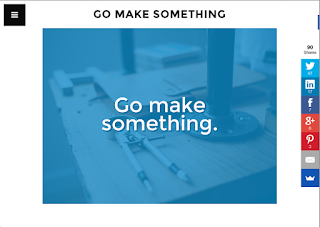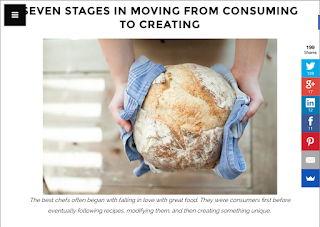Summary of Post 1: In John Spencer's latest post, Go Make Something, he mentions how people always have something to complain about. Although with these complaints, there is no effort to come up with a solution. He provided several examples of situations where some educators were solving conflicts with applying project-based learning. He asks his readers that the next time we have a complaint, respond with the questions: "What have I made to help solve the problem? If not... Who do I know that is solving this problem? How can I promote that solution?"
He then lists the risks of being a maker. John says that they are real and they should not be glossed over.
- You expose your idea to the potential of failure- "Once you actually commit to making something, you face the very really risk where it might tank entirely."
- You expose yourself to scrutiny- You get criticized and it might hurt sometimes.
- You feel exhausted- Ideas take time and aren't always easy. They also take energy.
- You upset people- You might make enemies because of your opinions.
- You face your limitations- You have to admit and ask for help because we don't know everything.
On the other hand, John lists the benefits of being a teacher-maker.
- You get to test what works, and what doesn't work in education.
- It's often fun- Although criticized sometimes, good and fun does come out of making things.
- You get to serve others- Changing someone's life can be very impactful.
- You learn what you don't know- Everyone is constantly learning, even as a maker.
John says ultimately kids need teacher-makers. Although parents play an important role in their own students life, the teachers are the stakeholders. Teachers remember what it requires to be a student and to be able to do the things they do. John encourages his readers to, "Start a movement. Build a platform. Craft a product. Design a system. Solve a complex problem. Invent. Create. Ask. Build. Learn. Be a maker."
C4Ta#3 Comment 1
Comment 1: I really enjoyed reading your post. As a secondary education major in college, I'm excited to read new things and see what other teachers have to say about the classroom. Although I won't be in the classroom for a couple of years, it's nice to see different strategies to use and I can see myself applying this in my own one day. Thank you!
C4Ta#3 Post 2
Summary of Post 2: In John Spencer's latest post, Seven Stages in Moving from Consuming to Creating, he shares his point of view being an educator and a father. As an educator, he said it was ultimately frustrating to see students using technology to consume it, rather than create with it. Spencer said he did not see until he had children of his own that "creativity is inherently social." We learn from other people and students look up to adults as well. He witnessed them going through a process of noticing, exploring, copying, and finally finding their own way. Not only did he see this in his own children, but also in the students he taught in the classroom. Ultimately, Spencer said there are 7 stages that we go through from move from being consumers of the media, to creators of the media.
1. Exposure- Either passive or direct. We get hooked on something we like one way or the other.
2. Active Consuming- Actively seeking out, not as a fan, but as a consumer. In the way that is more focused on the aesthetics or focused on practical utility.
3. Critical Consuming- Taste becomes more refined. You become start to become an expert of your interest.
4. Curating- Both a fan and critic in this stage, according to Spencer. You start picking out the best and start commenting on it.
5. Copying- as it sounds.
6. Mash-Ups- Collaborating other interests you like in the mix as well.
7. Creating- You start being original.
Spencer admitted in the end, the steps aren't locked in place. Some students skip steps, and some go through the simultaneously. He then ends that going from consuming to creating is more of a journey than a jump.
C4Ta#3 Comment 2
Comment 2: I personally find myself consuming more than I do creating. But coming to college has really opened up the creating aspect for me. Being out on your own, I find myself having to create more out of consuming what I've been taught. As a kid though, especially with the imagination, I remember doing the same thing as well. It's a journey, rather than a jump.


Excellent summaries. Excellent comments!
ReplyDeleteThank you.